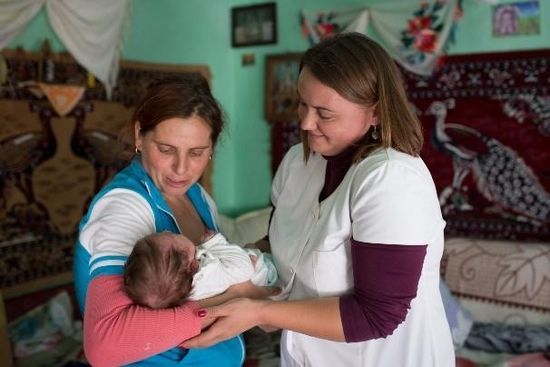
Inequities in sexual, reproductive, maternal, newborn, child and adolescent health (SRMNCAH) throughout the world mean that certain population subgroups have systematically worse health outcomes and poorer access to services and interventions. Addressing inequities in SRMNCAH is central to achieving universal health coverage, protecting human rights, advancing gender equality, combating discrimination and improving the social determinants of health. This course introduces the general steps of inequality monitoring in the context of SRMNCAH.
Photo credit: WHO / Igor Vrabie
Idioma: English
Health topic
Informações do curso
Overview: Equity is essential to the Sustainable Development Goal principle of ‘leaving no one behind’, as well as central to the WHO 13th General Programme of Work (GPW 13) objective of ‘serving the vulnerable’. The Global Strategy for Women’s, Children’s and Adolescents’ Health (2016 – 2030) envisions a world in which every woman, child and adolescent realizes their rights to physical and mental health and well-being. It upholds a focus on the most disadvantaged people, prioritizing the importance of monitoring with an equity lens.
Regular monitoring and review of inequalities in SRMNCAH by stakeholders at regional, national and subnational levels is a critical input for evidence-based decision-making for equity-oriented SRMNCAH programming. The results of inequality monitoring can be used as an input (alongside other forms of knowledge and evidence) to determine where efforts are needed to accelerate improvements for disadvantaged subgroups.
This course examines the five general steps of inequality monitoring in the context of SRMNCAH. The target audience is primarily people involved in national SRMNCAH monitoring and evaluation efforts, including officers, plus programme managers who have basic knowledge and experience working with SRMNCAH data. The course may also be of interest to students and researchers.
Course duration: Approximately 2 hours.
Certificates: A Record of Achievement will be available to participants who score at least 80% across all graded assessments. Participants who receive a Record of Achievement can also download an Open Badge for this course. Click here to learn how.
O que você vai aprender
- Apply the five steps of inequality monitoring in the context of SRMNCAH
- Determine the purpose and scope of a monitoring exercise
- Conduct data source mapping and obtain the data required to monitor inequalities in SRMNCAH
- Use basic analytical methods to analyse inequality data
- Describe and apply good practices in reporting the state of inequality in SRMNCAH to a defined target audience
- Understand considerations for knowledge translation; that is, promoting the use of data to inform equitable programmes and policies
Conteúdo do curso
Introduction:
The introductory module gives an overview of monitoring inequality in the context of SRMNCAH.Module 1: Determine scope of monitoring:
By the end of this module, you will be able to: explain the processes of deciding the target population (or populations) that the monitoring activity will cover; identify relevant SRMNCAH indicators; and identify relevant dimensions of inequality.Module 2: Obtain data:
By the end of this module, you will be able to: explain how to conduct data source mapping; and describe how to determine whether sufficient data are currently available to conduct inequality monitoring.Module 3: Analyse data:
By the end of this module, you will be able to: describe how to prepare disaggregated data; and explain how to calculate selected summary measures of inequality.Module 4: Report results:
By the end of this module, you will be able to: explain how to define the purpose of reporting and the target audience; describe decisions surrounding the scope of reporting, the technical content and the methods of presenting data; and describe best practices in reporting results of inequality monitoring.Module 5: Knowledge translation:
By the end of this module, you will be able to: apply a systematic approach to identifying priority areas for action; describe how to contextualize findings; explain the importance of integrating equity considerations into SRMNCAH programmes and policies; and explain the importance of intersectoral collaboration.Final Assessment
Inscrever-me neste curso
Requisitos de certificado
- Ganhe um registro de conquista ao ganhar mais de 80% do número máximo de pontos de todas as tarefas com nota.
- Ganhe um Open Badge ao concluir o curso.